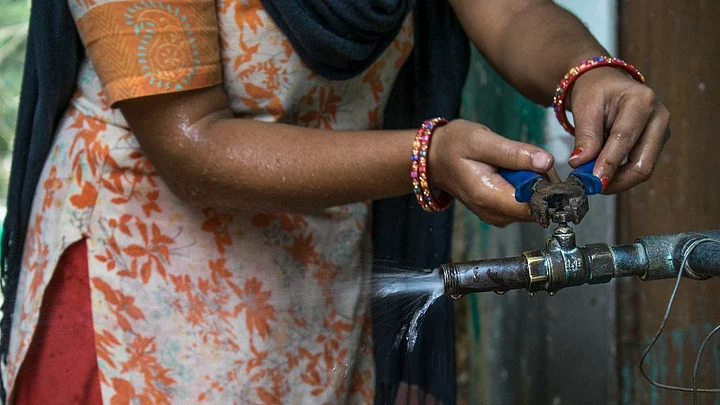What happens when one of the most basic needs for survival – water – becomes so scarce that the costliest entity in your possession becomes a mere glass of water?Delhi’s largest unauthorised colony, Sangam Vihar, has been witnessing such a crisis over the years.
This crisis-hit region, which faces severe water shortage, is gradually turning into a war zone. On 14 June the locality also witnessed a murder in which a 45-year-old Kishan Bhadana, brother of councillor Suresh Bhadana was shot dead by his neighbours.
"The cause of the quarrel was that the deceased, Kishan, wanted to seek a water connection from the DJB pipeline for his home and the accused, Babli, and others were objecting," DCP (south) Romil Baaniya said to TOI.
Most of the colony does not have an authorised direct water-pipeline connection to supply water to the houses. Under such circumstances, the residents rely on private water tankers, having no choice but to pay close to Rs 700-800 for 2,000 litres of water. This rate even scales up to Rs 1,500 during times of extreme scarcity and severe need.
But the question is why do residents burn their pockets when they have the alternative of calling in government tankers which will provide them water free of cost?
Locals say government tankers are reluctant to come to the colony as that involves driving through narrow and uneven roads.
We keep calling the tankers but they come only after a lot of pleading. Sometimes, it is after months of wait that they come.Parveen, a 28- year old resident of I Block of Sangam Vihar.
Even if the tankers do come, it is mostly at the insistence of the so-called ‘powerful’ residents of the colony. This is a cause of major concern among the locals as it puts them at the mercy of the power-wielding residents.
On the other hand, the fate of the houses which have an authorised pipeline are no better off than others. Such houses are defenceless against the people who have taken control over the borewell which supplies water through the pipelines. “Pipelines of many houses are kept under lock. Water is released to each house by turns. Whenever our turn comes, we have to go and ask the caretaker of the borewell to give us the key. It is only after that, that we can access the water,” says 55-year old Laxman Singh Mehta. He adds, “The dirty dishes keep piling as we wait for water supply. They take up most of the space in our house.”
The locals claim that the distribution of water is usually done by unfair means, and that this has also reportedly led to violent and aggressive brawls on a daily basis.
Sunita Gupta, Mehta’s neighbour says, “If you are in the good books of the caretaker, and you keep appeasing him materially, it is very likely that your turn will come soon. Otherwise no one here will respond to your appeals.”
There are borewells in this locality that have been dug up by the government. In a water-scarce region these become excellent vote winners. But as residents claim, once an election is won on the pretext of providing water, the MLA disappears. “In the absence of the MLA, the control of the borewell is taken up by those people who are close to the MLA,” says Vijay Bhadana a social worker and also caretaker of a borewell. He also says that there is a nexus between the MLA and those that control the borewell and it becomes a profiteering exercise.
The water from these government borewells is extracted by the men who control it before it can chart its way to the interiors of the colony, rendering those areas waterless. This extracted water is then filtered, bottled and supplied to those very areas at a price by them.Vijay Bhadana, Social Worker
Sangam Vihar MLA Dinesh Mohaniya cannot be reached despite making several attempts.
(Ahmad Belal is an MA student in Convergent Journalism at Jamia Millia Islamia. He tweets @ahmadbelalji. Sania Ashraf is an MA student in Convergent Journalism at Jamia Millia Islamia. She tweets at @AshrafSania.
(At The Quint, we question everything. Play an active role in shaping our journalism by becoming a member today.)
